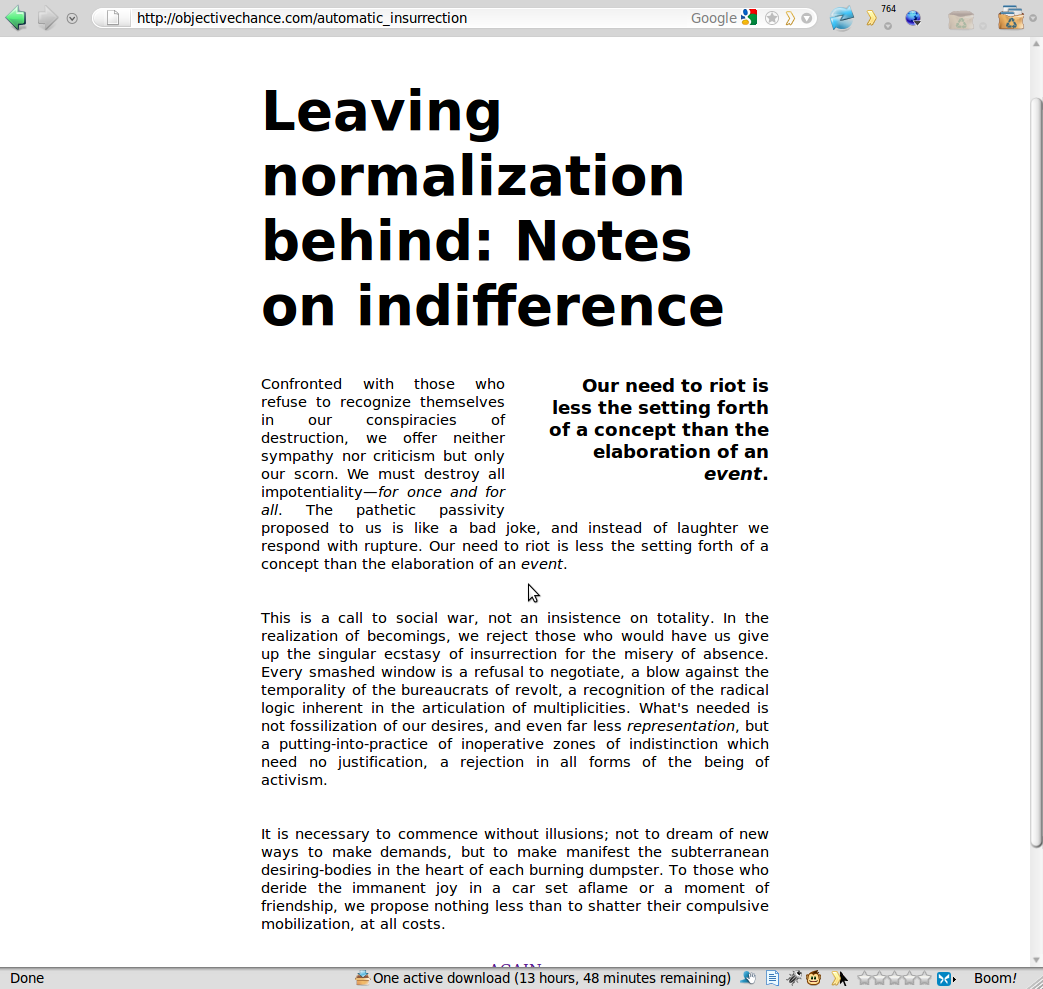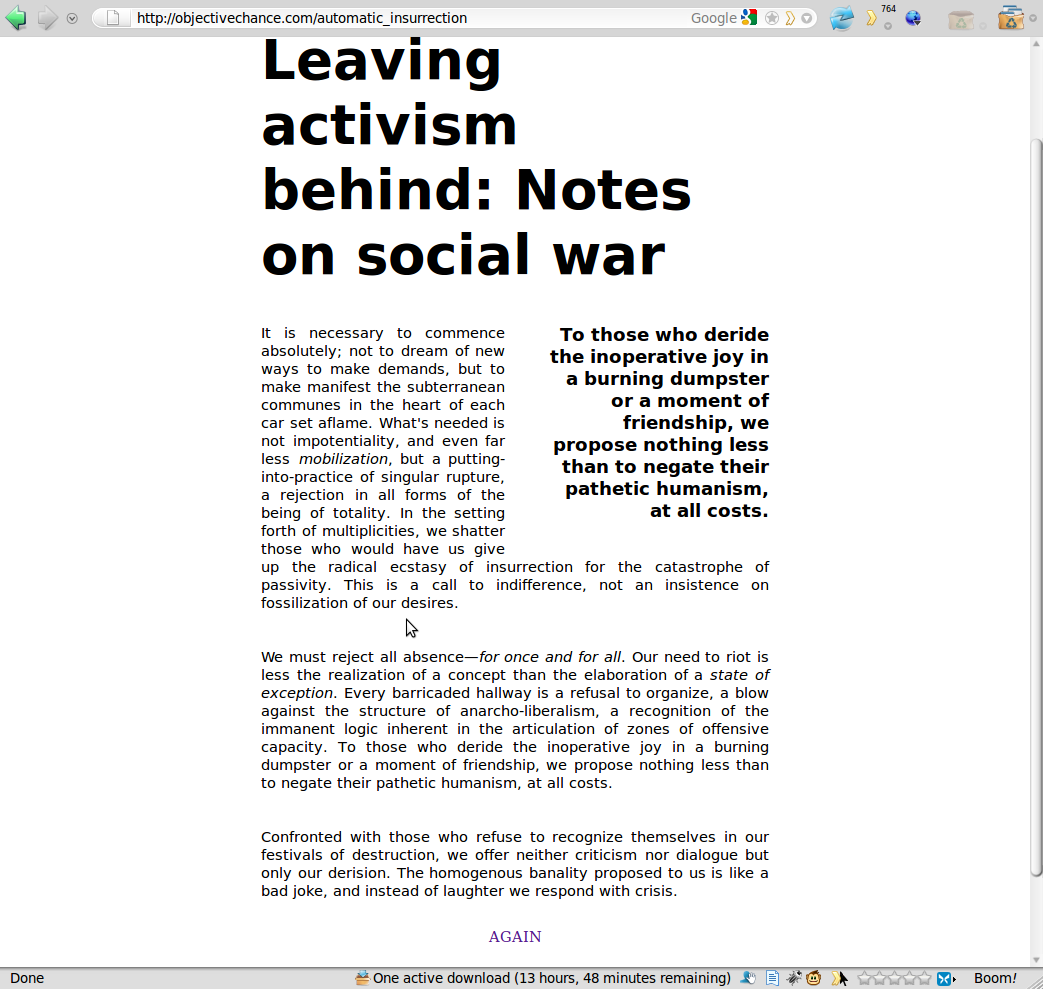On Being Pretty Much O.K. With That. (Factories, Corporate Secrecy, and Free-Market Anti-Capitalism Edition.)
Here’s a couple of loosely-related conversations from elsewhere on the web. I bring up the less recent one because the more recent one reminded me somewhat of it.
A while back (last May) I was hepped to an odd conversation on left-libertarianism
going on over at the Mises Community Forum. I decided to jump in on a terminological point; the thread then became something of a quiz about left-libertarian and free-market anti-capitalist economic beliefs. In reply to some questions posed by Freedom4Me73986,
I answered that, in addition to being a free market anti-capitalist, sure, I also call myself a socialist, and yes, I am anti-boss.
Freedom4Me73986:
@Charles Johnson: Do you call yourself a socialist?
Yes, in Tucker’s sense. Some reasons for doing so discussed here, and here, and also here.
And are you anti-boss like many others in the ALL seem to be?
Sure.
I think bossing and conventional employment are both (1) likely to be unstable, and economically unsustainable, in a fully freed market; and (2) kind of shitty ways to treat your fellow human beings.
In reply, Freedom4Me73986 asked:
So how does a
bosslessfactory work if there’s over 100 workers? How can that many people all make decisions w/o a boss? How can 10 people make a decision w/o a boss? Bosses exist for a reason. There way more efficient. Without one nothing would get done.
To which I answered, first, that you might look at existing examples of big factories running without a boss; but that there is also a more important point. Boldface added.
Well, I dunno. I guess if you really want to know the answer to this question, and don’t just intend it as an apriori
Gotcha!about what you are already sure must be unworkable, then probably the best thing to do is to ask some of the people who already work in bossless factories with over 100 workers. There are a number of interviews in books like this one. My impression is that it is typically done with a combination of temporary, constantly-rotating responsibilities, a lot of local initiative on the shop floor, and regular big group meetings for making decisions as a group. Maybe this is an inefficient way to do things. On the other hand it seems to be working for the people who are doing it. In any case, I am quite sure that the claim that “Without [a boss] nothing would get done” is empirically falsifiable, and has in fact been falsified. Spontaneous orders are of course possible without central direction.But in any case suppose that it turned out to be true[1] that on the whole, in a maximally freed market, the complexity and the costs of keeping everyone communicating with everyone else would tend to hobble the workability of big factories without bosses. That might be a reason to think that there will be more bosses in a freed market than I think there will be. But it might just as well be a reason to think: Well, then there will be smaller factories. And if we turn out to have smaller factories, with their activities largely coordinated by trade and contract rather than by bureaucratic management, I don’t see how that would be a problem. Certainly there is no reason apriori why libertarian economics would have to be concerned with figuring out a way to run giant factories with hundreds of workers. If that turns out to be economically and socially sustainable under conditions of free-market competition, then people will do it. But I don’t take it for granted that it will be, and if it isn’t, then people won’t sustain it, and will find other market means of meeting their needs.
In fact I would say there are some strong reasons to think that that kind of business model — at least, nearly every example of that business model that we have available to us for inspection, from General Motors to Lockheed-Martin to GlaxoSmithKline to Foxconn — is not a product of freed market labor agreements, but rather of a pretty heavy-handed structure of government-financed lines of credit, government privileges, government subsidies, and government contracts to the employers, on the one hand, and on the other hand, political impoverishment, political dispossession, and political constraints on the employee’s options for alternative modes of making a living. My reasons for thinking that bossing will be unsustainable in fact have a lot to do with factors that will apply whether or not big factories tend to need bosses (e.g., they have to do with the changes which are more likely, ceteris paribus, to occur within labor markets when people’s fixed costs of living are radically lower, and their options for making a living outside of formalized employment relationships have radically expanded, as discussed briefly e.g. in
The Many Monopoliesand in Scratching By — all of which are changes that, if they are likely to come about, are likely to come about regardless of the organizational economics of trying to run a large factory.)
I’m reminded of the conversation back in May because of a different thread in Stephan Kinsella’s recent AmA on Reddit. Kinsella highlighted his opposition to patents and copyrights in the pitch for his AmA, and a lot of the conversation focused on the topic of IP. When asked, Kinsella added that in addition to patent and copyright, he also favored the abolition of trademark and trade secret laws, saying:
I am totally against patent, copyright, and also tradmeark and trade secret. Trademark law should be replaced with fraud law only. Trade secret should just be a private contract. Easy.
— N. Stpehan Kinsella (23 January 2013), re:
I am Stephan Kinsella … AMAat /r/IAmA
Redditor /u/probablyreasonable asked, in response:
Trade secret entirely replaced as a private contract? You’re joking right? What of the litany of examples where exiting employees do not sign their nondisclosure? What of the litany of examples where the disclosing party was not in privity with the TS owner?
Please elaborate.
— /u/probablyreasonable (23 January 2013), re:
I am Stephan Kinsella … AMAat /r/IAmA
I answered with a charitable clarification of Stephan’s position (as far as I understand it), and then some commentary of my own on the argument, in which I am speaking only for myself. If government doesn’t enforce corporate secrecy, then corporations may have more trouble keeping their secrets. Well, then there may be fewer companies keeping secrets. I’m pretty much OK with that.
Stephan’s view is that if they didn’t sign the contract, then their actions should not be prosecutable. The reason they should not be prosecutable is because they didn’t violate any rights that they were bound to respect. This means that only people who have agreed to keep a secret can be bound to keep it; if that arrangement causes a problem for companies being able to police their own secrets, then we may well end up with fewer businesses whose business models depend on keeping information secret. Well, OK. It’s not obvious, to me at least, that this is a bad outcome.
— Charles Johnson (23 January 2013), re:
I am Stephan Kinsella … AMAat /r/IAmA
probablyreasonable replied with what seems to me a bizarre non sequitur, about utopianism and corporate espionage.
Corporate espionage unpunished and will encourage the behavior to increase profitability and competitiveness.
Again, all of Stephan’s arguments presuppose that everyone in our society is healthy, co-operative, and not driven to criminal behavior. This is not the case.
— /u/probablyreasonable (23 January 2013), re:
I am Stephan Kinsella … AMAat /r/IAmA
Again, speaking only for myself and not all of Stephan’s arguments,
I replied:
That’s a problem if you think that
corporate espionageis a problem. I think that corporate business models that are heavily dependent on secrecy and institutional opacity are the problem, and thatcorporate espionageis a predictable reaction, and a symptom of a broken business model. If companies can adequately keep their secrets by means of contractual agreements and simple property rights (e.g., controlling who has access to sensitive locations or documents in their possession) then they will keep their secrets. If they cannot adequately keep their secrets by these means, then they will fail at keeping their secrets. And if their business depends on keeping secrets, they will fail at their business. That doesn’t mean that nobody will go into business; it means that people who go into business will find it to their advantage to adopt alternative business models, which don’t depend so heavily on secrecy. Again, you need to actually give an argument if you want to establish that this is an unjust, or even an undesirable outcome.— Charles Johnson (23 January 2013), re:
I am Stephan Kinsella … AMAat /r/IAmA
There is no reason at all why writers who defend market relationships should feel compelled to rig their theory in such a way that it could somehow justify, explain the value of, or defend the interests of gigantic-scale factory production, or rigidly-enforced institutional opacity and corporate secrecy. Speaking for myself, as a free-market anti-capitalist, I think that one of the great values of open, bottom-up market relations are the radical possibilities they might offer for destabilizing these deeply dysfunctional, monopolistically policed concentrations of commercial and industrial power.
Also.
- GT 2005-07-06: Libertarians for Protectionism,
- GT 2006-01-29: Libertarians for Protectionism, Appendix A
- GT 2008-05-29: Dump the rentiers off your back
- GT 2009-01-21: Libertarians for Protectionism, Appendix B
- GT 2010-10-25: Your Broken Business Model Is Not My Problem
- [1]I’m not committed to this claim, but I don’t reject it out of hand either.↩

